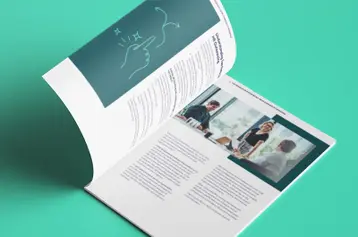Trends & Insights
Latest

Benefits
When Does COBRA Coverage Start?
COBRA offers employees continued health insurance following a termination, but when does COBRA coverage start? Learn the details here.
February 23, 2026 ・8 mins read
Read more
Compliance
What Is Form W-3 and Do I Have to File One?
W-3 forms provide totals of salaries paid and amounts withheld for each employee. They must be filed with the Social Security Administration.
February 13, 2026 ・3 mins read
Read more
Payroll
How Payroll Outsourcing Services Can Help My Business Thrive
Discover how payroll outsourcing services can streamline processes and save time, potentially reduce costs saving, and provide compliance support, allowing businesses to focus on core operations.
February 12, 2026 ・7 mins read
Read more
Culture
National Boss's Day: How to Celebrate Your Boss Like a Boss
February 20, 2026 ・10 mins read
Read more
Talent
Effective Employee Retention Strategies: How to Reduce Turnover
February 19, 2026 ・9 mins read
Read more
Payroll
When Do W-2s Come Out?
February 17, 2026 ・3 mins read
Read more
Multi-State Payroll: Employer Guide to Compliance and Tax Regulations
Does your company have employees in different states? Read this guide to learn essential tips for payroll tax laws, compliance, and more.
February 11, 2026 ・7 mins read
Read more

Benefits
When Does COBRA Coverage Start?
COBRA offers employees continued health insurance following a termination, but when does COBRA coverage start? Learn the details here.
February 23, 2026 ・8 mins read
Read more
Culture
National Boss's Day: How to Celebrate Your Boss Like a Boss
February 20, 2026 ・10 mins read
Read more
Talent
Effective Employee Retention Strategies: How to Reduce Turnover
February 19, 2026 ・9 mins read
Read more
Payroll
When Do W-2s Come Out?
February 17, 2026 ・3 mins read
Read more
Compliance
What Is Form W-3 and Do I Have to File One?
W-3 forms provide totals of salaries paid and amounts withheld for each employee. They must be filed with the Social Security Administration.
February 13, 2026 ・3 mins read
Read more
Payroll
How Payroll Outsourcing Services Can Help My Business Thrive
Discover how payroll outsourcing services can streamline processes and save time, potentially reduce costs saving, and provide compliance support, allowing businesses to focus on core operations.
February 12, 2026 ・7 mins read
Read more
Multi-State Payroll: Employer Guide to Compliance and Tax Regulations
Does your company have employees in different states? Read this guide to learn essential tips for payroll tax laws, compliance, and more.
February 11, 2026 ・7 mins read
Read more
Benefits
Benefits
Top Resources
E-GUIDE
The Benefits of Employee Benefits to SMBs
A innovative benefits offering helps attract and keep the talent you need to succeed. But do you know what benefits your employees want? Find out with our latest eGuide.
Get eGuide
E-GUIDE
Seven Steps to Becoming an Employer of Choice
Bringing in the best and brightest employees can improve productivity, innovation, company culture and brand recognition, all of which contribute to your success. Get our Seven Steps to Becoming an Employer of Choice
Get eGuide

E-GUIDE
Why TriNet: Discover the Power of HR Outsourcing for Business Success
A guide for business owners or HR leaders who are considering switching from in-house HR to outsourced.
Get eGuide
E-GUIDE
The Benefits of Employee Benefits to SMBs
A innovative benefits offering helps attract and keep the talent you need to succeed. But do you know what benefits your employees want? Find out with our latest eGuide.
Get eGuide
E-GUIDE
Seven Steps to Becoming an Employer of Choice
Bringing in the best and brightest employees can improve productivity, innovation, company culture and brand recognition, all of which contribute to your success. Get our Seven Steps to Becoming an Employer of Choice
Get eGuide
Learn how TriNet’s comprehensive HR solutions can help your business.
Fill out the form and we’ll contact you to set up a time to chat.


